Early books
Found amongst our Cavendish-Bentinck collection in the Women's Library is Un aventurier au XVIII siècle, le chevalier d’Ėon, 1728-1810 by Octave Homberg and Fernand Jousselin, published in Paris in 1904. It tells the story of a French aristocratic diplomat at the time of Louis XV who led a double life as Charles / Lia.
There’s also the groundbreaking Die Transvestiten, published in 1910, by the German doctor and sexologist, Magnus Hirschfeld. He was an early LGBT activist who came up with a new term for gender non-conformity – the transvestite – those who wanted to cross dress.
Early groups
We hold the papers and newsletters of groups that thought about sex and gender. The Aëthnic Union was set up in 1912 by the barrister, Thomas Baty (also known as Irene Clyde), to do just this. Amongst the membership were the couple Esther Roper and Eva Gore Booth, animal rights campaigner, Jessey Wade, and novelist and Montessori educator, Dorothy Cornish. They were all involved in the suffrage movement.
This group went on to publish Urania, a privately circulated journal, starting in 1916 and running until 1940. Urania is available online.
Urania stated: “Sex is an accident” and “There are no ‘men’ and ‘women’ in Urania”. Articles were published from around the world on same sex relationships, androgyny and sex changes.
Find out more:
Society has split perfection into two, and imposes on the individual spirit conformity to one of two warped ideals: the stern masculine and the trivial feminine.
– Aëthnic Union.
Groups: the 1960s
The mid-1960s is a key point in LGBT history when Lesbian, Gay and Trans groups began to speak more collectively on their own behalf through the formation of various support groups. Each group produced its own newsletter for members which contained articles on many relevant topics, gave advice and tips, and there were often personal stories.
The Beaumont Society was originally set up in 1966 as a secret transvestite group and produced its newsletter Beaumont Bulletin for members from 1968. It was a time when there was little tolerance or knowledge from the public, the law or the police, and the bulletin provided news, advice and notices of social events where members could meet in safety. The Beaumont Society gradually evolved. In 1982, WOBS (Women of the Beaumont Society) was established to support wives or partners.The Beaumont Society is still active today and welcomes any section of the transgender community.
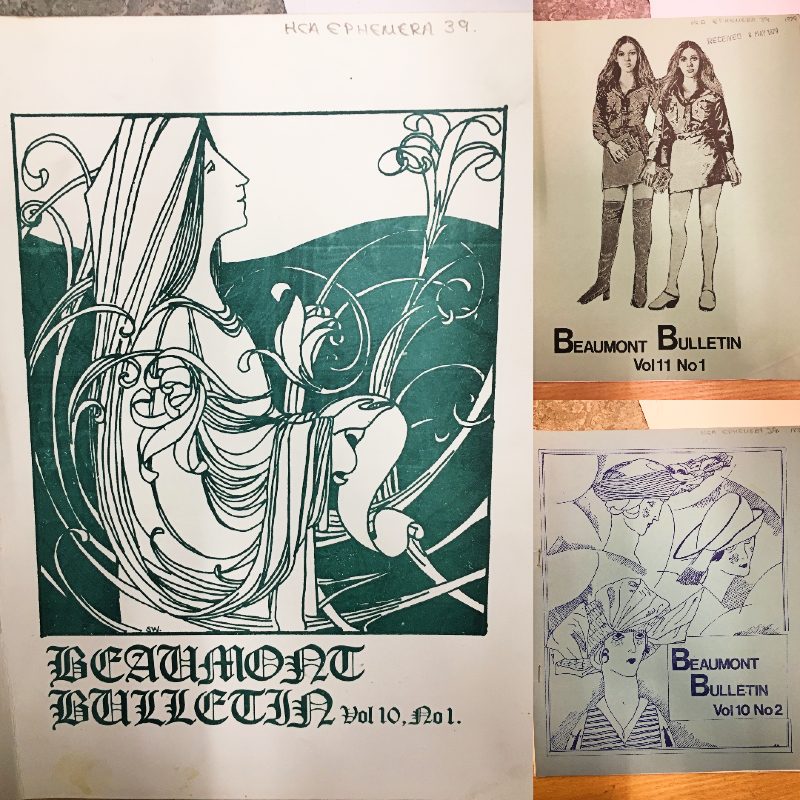
Groups: the 1970s
People questioning their gender identity faced considerable challenges in the 1970s. The idea of coming out was voiced by the Gay Liberation Front and the Campaign for Homosexual Equality created a network of local groups around the country.
This leaflet was compiled by Bob Harris of the training group of Gay Switchboard (a telephone helpline established in 1974) to provide information on and for transvestites and transsexuals.
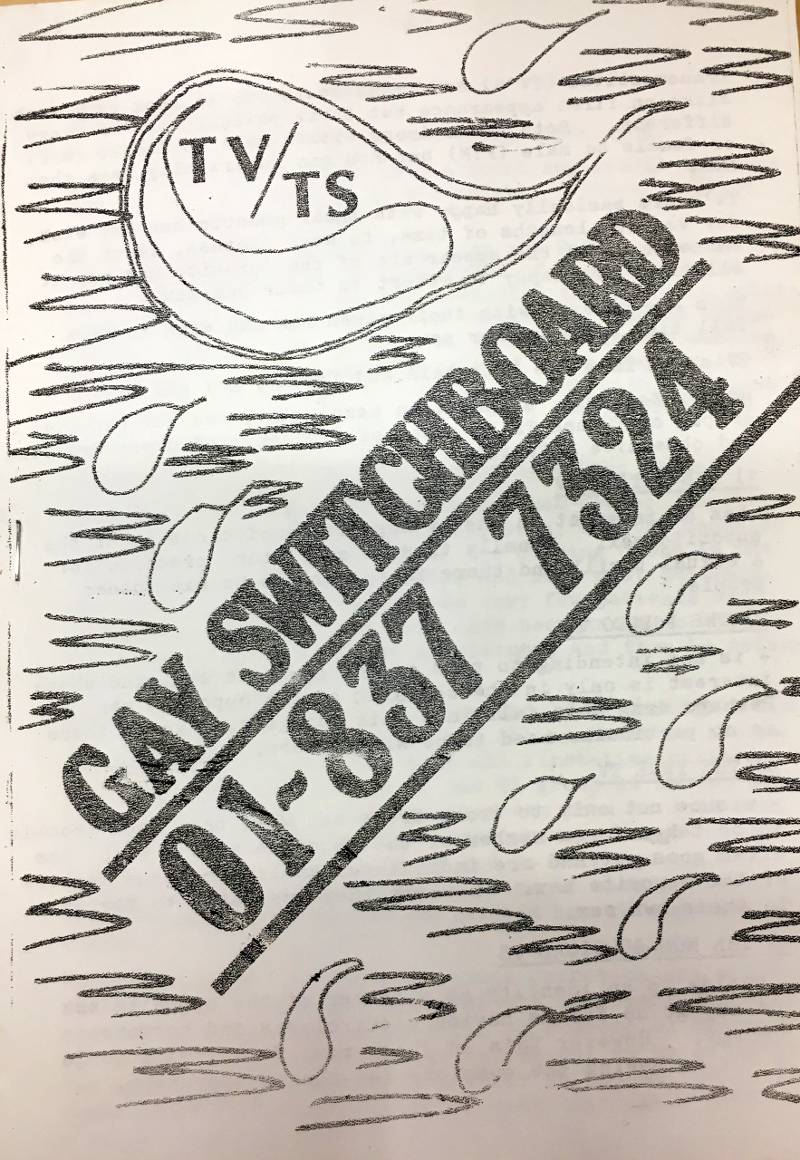
In 1976, London FRIEND (a social and support network) allowed transvestites and transsexuals to use its premises in Islington for meetings. It became an autonomous group with its own membership and journal, The Glad Rag, which kept members in touch with each other. By 1979, London FRIEND decided to set up a new telephone line for TV / TS callers.
Also in 1979, SHAFT (Self-Help Association for Transsexuals) was founded by Judy Cousins, a sculptor and golfer. SHAFT became the major UK group for transsexuals during the 1980s. The first newsletter was issued in February 1980 and gives information about a film made by Nationwide (BBC current affairs television programme) of the group and of Judy, editor of the newsletter, who added: “The details of my life will, I hope, help to show that transsexuals can be normal people with normal lives.” The group was renamed the Gender Dysphoria Trust International in 1989.
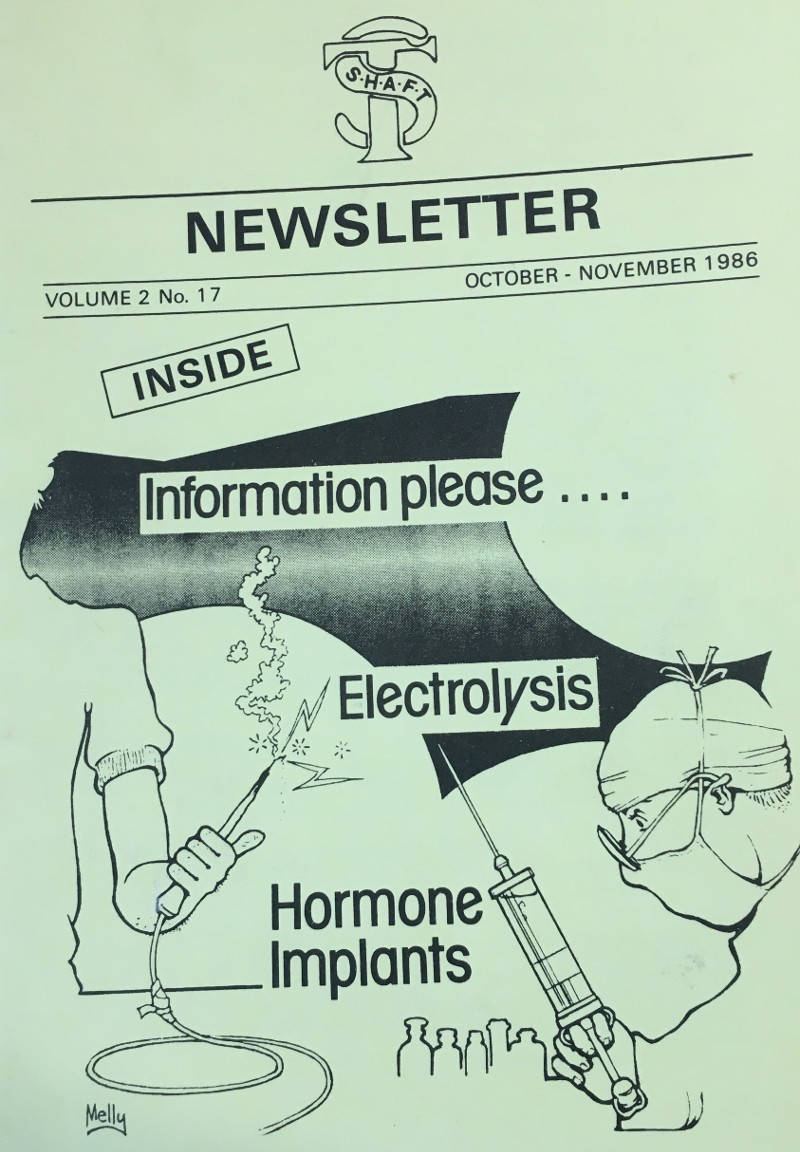
FTM Network was set up by Stephen Whittle in 1989 as a group offering support and advice to female to male trans people and their families. It continued until 2000. Stephen answered enquiries and edited early editions of the network’s newsletter Boy’s Own.
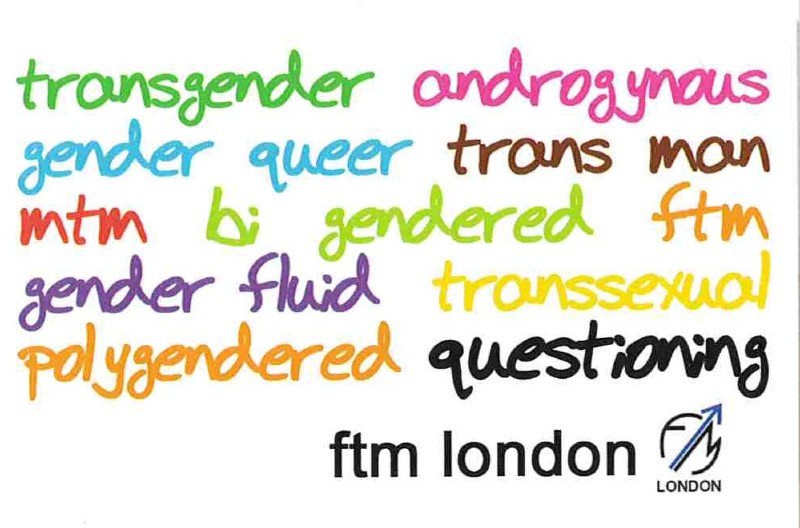
Press For Change was founded in February 1992 to “seek respect and equality for all trans people in the UK, through case law, legislation, and social change”. We hold the organisational papers of the group, the lobbying papers of Christine Burns and the campaigning papers that brought about the Gender Recognition Act 2004 and the Equality Act 2010. This includes papers on the work of the Parliamentary Forum on Transsexualism established by Dr Lynne Jones and Dr Jane Playdon in 1994.
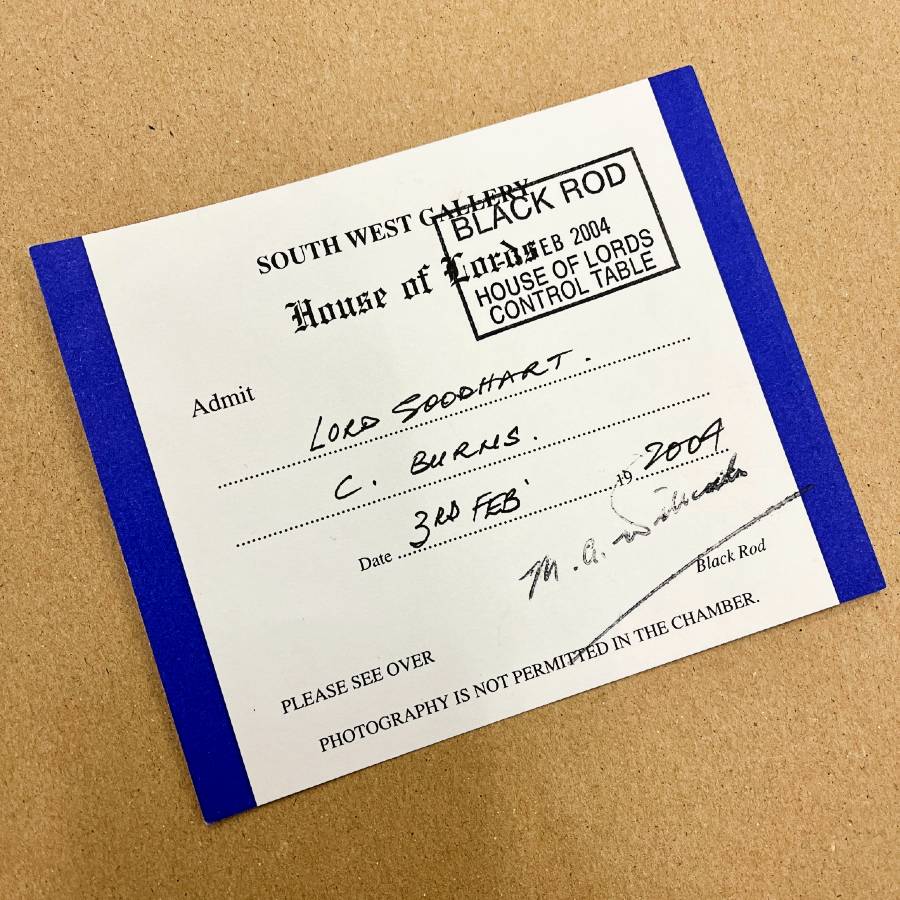
GIRES (Gender Identity Research and Education Society) was established in 1997 by Bernard and Terry Reed after their trans-daughter Niki won a landmark sex discrimination case. GIRES is a UK-wide organisation to improve the lives of trans and gender diverse people of all ages including non-binary and non-gender.
Conferences
The first International Symposium on Gender Identity was held in July 1969 at the Piccadilly Hotel and sponsored by the Albany Trust and the Erickson Educational Foundation New York. Papers on transvestism and transsexualism were delivered.
The first national TV / TS conference was held in Leeds on 15 to 17 March 1974, sponsored by the Leeds University TV / TS Group.

Further conferences were organised by the Beaumont Society at Leicester University in April 1975.
Individuals
We hold some autobiographies of those who have undergone gender reassignment. Examples include the stories of Michael Dillon in Self (1946), Roberta Cowell in Roberta Cowell’s Story (1954) and Dawn Langley in Man into Women: a transsexual autobiography (1970).
We hold archives that tell the pioneering campaigning work of trans activists.
Mark Rees began his personal campaign to amend his birth certificate in 1972. His archives follow his challenge against the government to amend his birth certificate and his case being brought before the European Court of Human Rights in 1986. This was not successful. Mark’s archive contains correspondence with barrister and Liberal Democrat MP Alex Carlile (now Lord Carlile of Berriew), who was an ally in the fight for legal recognition for transsexuals. Alex organised a meeting of transsexuals and supporters in his office in 1992, which moved to a nearby café, and so began the group Press for Change. Mark’s archive contains letters of support, campaigning and lobbying papers, and papers relating to his appearances on radio and television and reactions to these. 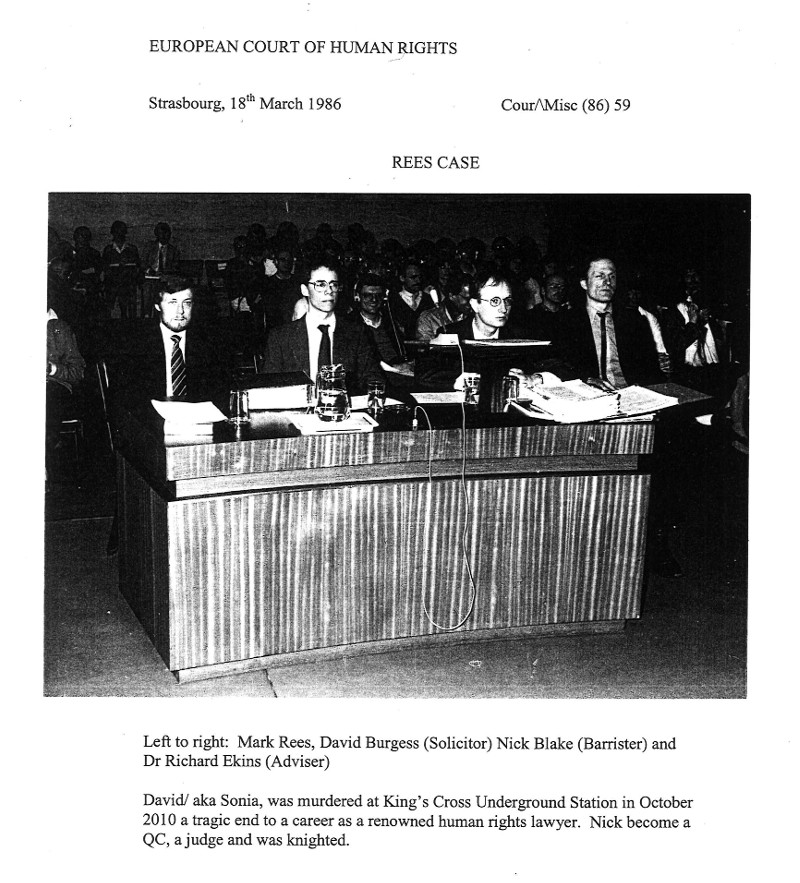
Stephen Whittle’s activism started in 1973 when he joined the group Campaign for Homosexual Equality. Two years later he transitioned from female to male and had reassignment surgery in 1979. Stephen studied law so that he could challenge the discrimination he and other trans people experienced. He set up the group FTM (Female to Male) in 1989 and co-founded Press for Change in 1992. Stephen’s archive follows his personal story and contains his research papers on transsexualism. This includes a significant collection of national and international trans-related print and ephemera such as Polare (The Gender Centre Magazine Australia) and TransSisters (Kansas City, USA).

Listen to Stephen’s talk about his life and Press For Change.
We hold the research papers of Bob Mellors (co-founder of the Gay Liberation Front at LSE) on his friend, Charlotte Bach, who's life he was conducting research on due to her gender identity.
Find out more:
You can find these items and many more by typing in the ‘anytext’ field in the archive catalogue, search terms such as androgy*, transvest*, transgender, transsexual*, “sex change”, “gender reassignment”, “gender critical” (use double speech marks for more than one word). Also search for a person’s name, eg. “Lynne Jones”, or for an organisation, eg. GIRES, or for title of journal, eg. SHAFT.
You should do similar searches in LSE Library’s main catalogue Library Search.
For ease, we have:
How to access
Most of the material highlighted here is stored in closed access and must be consulted in The Women’s Library Reading Room. Find out how to book your place and order material on our access archives and special collections page.
Further information
If you need specific help with any of the collections mentioned here get in touch with our Curator for Equality, Rights and Citizenship, Gillian Murphy.